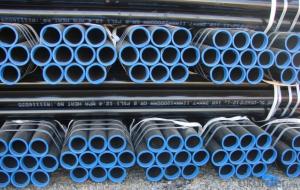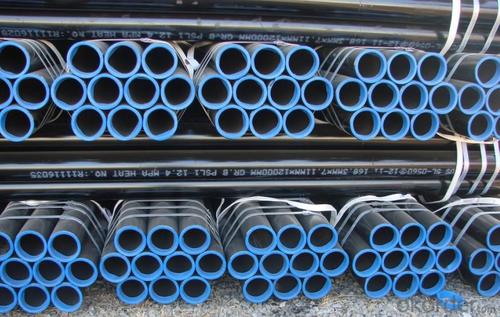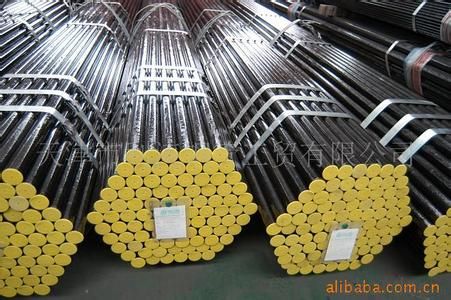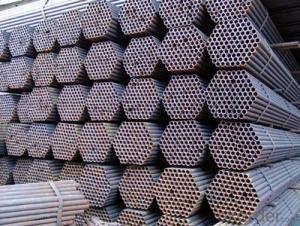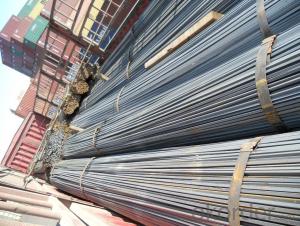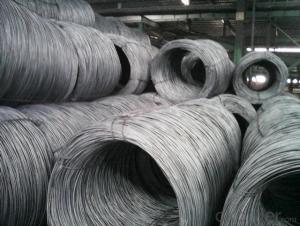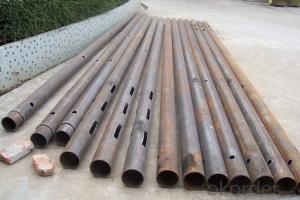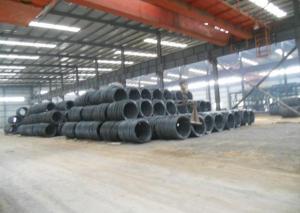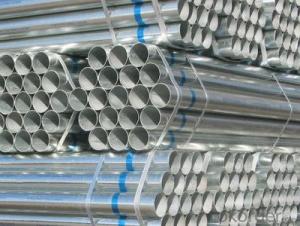Welded ERW Steel Pipe Q235
- Loading Port:
- China Main Port
- Payment Terms:
- TT or LC
- Min Order Qty:
- 35 m.t.
- Supply Capability:
- 12000 m.t./month
OKorder Service Pledge
OKorder Financial Service
You Might Also Like
1、Structure of Welded Black ERW Steel Pipe:
ERW steel pipe is electric resistance welding, the abbreviation for ERW for transporting oil and natural gas vapor liquid objects, can meet the requirements of high and low pressure, the transport in the world with pipe sector accounted for a pivotal position.
2、Main Features of Welded Black ERW Steel Pipe:
• High manufacturing accuracy
• High strength
• Good visual effect
• Reasonable price
• Small inertia resistance
• Strong heat dissipation ability
3、Welded Black ERW Steel Pipe Specification:
Standard | GB, DIN, ASTM ASTM A106-2006, ASTM A53-2007 |
Grade | 10#-45#, 16Mn 10#, 20#, 45#, 16Mn |
Thickness | 1 - 33 mm |
Section Shape | Round |
Outer Diameter | 21 - 610mm |
Place of Origin | Tianjin, China (Mainland) |
Secondary Or Not | Non-secondary |
Application | Hydraulic Pipe |
Technique | Cold Drawn |
Certification | API |
Surface Treatment | factory state or painted black |
Special Pipe | API Pipe |
Alloy Or Not | Non-alloy |
Length | 5-12M |
Outer Diameter | 21.3-610mm |
Grade | 20#, 45#, Q345, API J55, API K55, API L80, API N80, API P110, A53B |
Standard | ASME, ASTM |
1) Material:20#(ASTM A 106/A53 GRB.API5LGRB,GB),45#,16Mn,10#.
2) Specification range:OD:21.3-610mm,WT:6-70mm,length:6-12m or according to the requirement of clients.
3) Excutive standards:GB,ASME API5L.ASTM A 106/A53,Despite of the above standards,we can also supply seamless steel pipe with standard of DIN,JIS,and so on,and also develop new products according to the requirements of our clients!
4) Surface:black lacquered,varnish coating or galvanized.
5) Ends:Beveled or square cut,plastic capped,painted.
6) Packing:bundles wrapped with strong steel strip,seaworthy packing.
4、Packaging & Delivery
Packaging Details: | seaworthy package,bundles wrapped with strong steel strip |
Delivery Detail: | 15-30days after received 30%TT |
5、FAQ of Welded Black ERW Steel Pipe:
①How is the quality of your products?
Our products are manufactured strictly according to national and internaional standard, and we take a test
on every pipe before delivered out. If you want see our quality certifications and all kinds of testing report, please just ask us for it.
Guaranteed: If products’ quality don’t accord to discription as we give or the promise before you place order, we promise 100% refund.
②How about price?
Yes, we are factory and be able to give you lowest price below market one, and we have a policy that “ for saving time and absolutely honest business attitude, we quote as lowest as possible for any customer, and discount can be given according to quantity”,if you like bargain and factory price is not low enough as you think, just don’t waste your time.Please trust the quotation we would give you, it is professional one.
③Why should you chose us?
Chose happens because of quality, then price, We can give you both.Additionally, we can also offer professional products inquiry, products knowledge train(for agents), smooth goods delivery, exellent customer solution proposals.Our service formula: good quality+good price+good service=customer’s trust
SGS test is available, customer inspection before shipping is welcome, third party inspection is no problem.
6、 Welded Black ERW Steel Pipe Images:
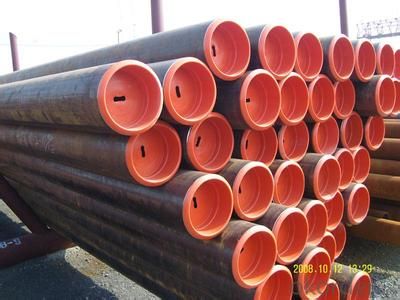
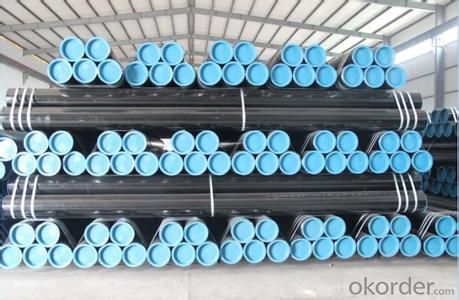
- Q: What time what time for gas pipeline steel pipe PE pipe
- PE pipe must be installed underground, the steel tube can be exposed, when not all PE pipe for pipe laying, overhead installation. But the steel tube is easy to rust, so it can be used where the basic use of PE pipe buried PE pipe.There are galvanized steel pipe and seamless steel pipe, galvanized pipe can only be used for low-pressure homes
- Q: What is the difference between carbon steel and stainless steel pipes?
- The main difference between carbon steel and stainless steel pipes lies in their composition and corrosion resistance. Carbon steel pipes are primarily made of iron and carbon, while stainless steel pipes contain iron, carbon, and a minimum of 10.5% chromium. This chromium content in stainless steel provides excellent corrosion resistance, making it more suitable for applications where pipes may come in contact with moisture or corrosive substances. Carbon steel pipes, on the other hand, are more cost-effective and commonly used in applications where corrosion resistance is not a primary requirement.
- Q: Can galvanized steel tubes simmer?
- Galvanized steel pipe can simmer bending.Is a set of bending bending bending die, no matter what kind of equipment, most are used in pipe, mainly used for oil and gas, infusion, more plays an important role in aircraft and engine.
- Q: What is the difference between steel pipe and PVC pipe?
- Steel pipe and PVC pipe are both commonly used materials for plumbing and other construction applications, but they have several key differences. Firstly, the material itself is different. Steel pipe is made from steel, which is an alloy of iron and carbon. It is known for its strength and durability, making it suitable for high-pressure applications and underground installations. On the other hand, PVC (polyvinyl chloride) pipe is made from a type of plastic known as PVC. It is lightweight, flexible, and easy to handle, making it a popular choice for residential plumbing and irrigation systems. Secondly, the installation process differs. Steel pipe requires skilled labor and specialized tools for cutting, threading, and welding. It often involves a complex installation process, especially for larger pipe sizes. PVC pipe, on the other hand, can be easily cut with a saw or specialized pipe cutter and joined together using solvent cement or threaded fittings. This makes PVC pipe more suitable for do-it-yourself projects and simpler installations. Thirdly, steel pipe has a higher cost compared to PVC pipe. Steel is a more expensive material, and the manufacturing process for steel pipe is more complex, involving multiple steps and additional materials. PVC pipe, being made from plastic, is generally cheaper and more cost-effective, especially for smaller diameter applications. In terms of performance, steel pipe has higher tensile strength, can withstand higher pressure, and is more resistant to temperature changes, making it ideal for heavy-duty and industrial applications. PVC pipe, on the other hand, has a lower tensile strength but is resistant to corrosion, chemicals, and scale buildup. It is commonly used in residential plumbing, irrigation systems, and other non-industrial applications. In summary, the main differences between steel pipe and PVC pipe lie in the material, installation process, cost, and performance characteristics. While steel pipe is stronger and more suitable for heavy-duty applications, PVC pipe is lighter, easier to install, and more cost-effective for residential and non-industrial uses.
- Q: Seamless steel tube 89X4 meters, how heavy?
- The theoretical weight calculation formula of plain carbon steel and alloy steel seamless pipe:W=0.02466 (D-S) S, the density of steel fand 7.85kg/dmNote: weight per meter kg/m= (outer diameter wall thickness) * wall thickness *0.02466 units, mm: mmFor example, the seamless steel pipe with a diameter of 89*4 weight per meter:(89-4) *4*0.02466=8.384 kg / M.
- Q: Can steel pipes be used for underground transportation tunnels?
- Yes, steel pipes can be used for underground transportation tunnels. Steel pipes are often used in the construction of underground tunnels due to their durability, strength, and resistance to corrosion. They can efficiently withstand the pressure and weight of the surrounding soil and provide a reliable transportation infrastructure.
- Q: Are steel pipes suitable for desalination plants?
- Desalination plants can benefit greatly from the use of steel pipes. These pipes possess a variety of advantages that make them an ideal option for such facilities. Firstly, their resistance to corrosion is of utmost importance in desalination plants, where saltwater can be highly corrosive. The fact that steel pipes can withstand such corrosive conditions ensures the durability and longevity of the infrastructure, ultimately reducing maintenance and replacement expenses. Secondly, steel pipes exhibit remarkable strength, enabling them to withstand high-pressure situations commonly encountered in desalination plants. The ability of steel pipes to handle intense water flow without deformation or leakage guarantees the efficient and dependable operation of the desalination process. Moreover, steel pipes boast excellent heat resistance properties, rendering them suitable for desalination plants that engage in heat-intensive procedures like distillation or reverse osmosis. These pipes can endure high temperatures without suffering any structural damage, ensuring the secure and efficient transfer of heated water or steam. Furthermore, steel pipes are readily available and come in a wide range of sizes and specifications, allowing for flexibility in the design and construction of desalination plants. This availability and versatility make steel pipes a cost-effective choice for desalination projects. Overall, due to their resistance to corrosion, high strength, heat resistance, availability, and cost-effectiveness, steel pipes are highly suitable for desalination plants and are extensively used in the industry.
- Q: Can steel pipes be used for underground fire protection systems?
- Yes, steel pipes can be used for underground fire protection systems. Steel pipes are commonly used in underground applications due to their durability, strength, and resistance to corrosion. They provide an effective means of delivering water for fire suppression in underground areas, ensuring the safety of the surrounding infrastructure.
- Q: How are steel pipes inspected for quality?
- Steel pipes are inspected for quality through various methods such as visual inspection, non-destructive testing techniques like ultrasonic testing, magnetic particle inspection, and radiographic testing. These inspections help identify any defects, cracks, or imperfections in the pipes, ensuring they meet the required quality standards. Additionally, mechanical tests such as tensile strength and hardness tests may also be conducted to assess the structural integrity of the steel pipes.
- Q: How are steel pipes used in the manufacturing of shipbuilding?
- Steel pipes are used in shipbuilding for various purposes such as constructing the ship's hull, piping systems for fuel and water transport, ventilation systems, and structural support. They provide strength, durability, and corrosion resistance, making them essential components in the construction and operation of ships.
Send your message to us
Welded ERW Steel Pipe Q235
- Loading Port:
- China Main Port
- Payment Terms:
- TT or LC
- Min Order Qty:
- 35 m.t.
- Supply Capability:
- 12000 m.t./month
OKorder Service Pledge
OKorder Financial Service
Similar products
Hot products
Hot Searches
Related keywords
